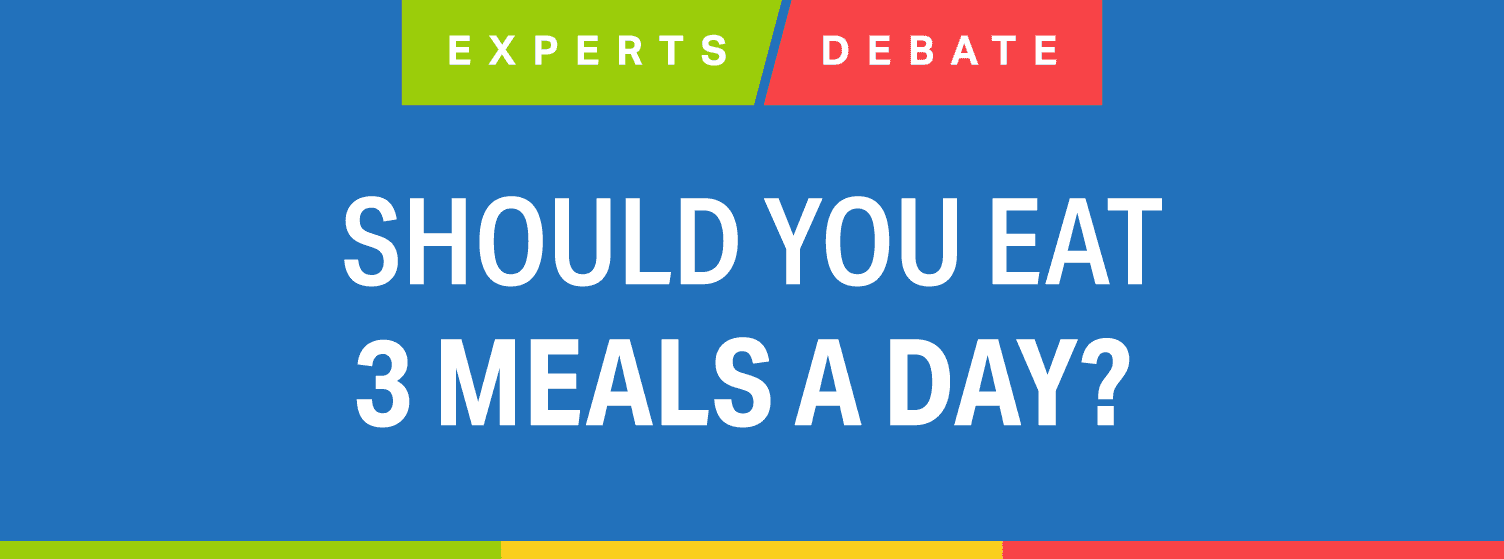For many of us, consuming three meals a day is just what we do — breakfast, lunch and dinner, plus (for many of us) some grazing in between. But with the rise of alternatives like time-restricted eating (TRE) and intermittent fasting (IF), which often lead to skipping meals due to smaller eating windows, it’s understandable if you’re questioning just how many meals a day you should eat to slim down. Fads like the one-meal-a-day diet and eating plans that call for multiple mini-meals each day only further complicate the meal-planning equation.
According to a 2012 study published in the journal Obesity, people who eat six smaller meals instead of three square meals may have fewer hunger pangs throughout the day. But both groups ultimately lose about the same amount of weight.
So, should you ditch three square meals for a new trendy diet or stick with the norm? Here, experts take sides in the great meal frequency debate.


Generally, eating three meals a day with one or two small snacks is a good rule of thumb for weight loss. A structured meal plan can help you stay satisfied and on track with a healthy routine.

It depends. If three meals a day is working for you, then go for it. But there is no hard evidence that a three-meal eating pattern is more effective for losing weight than others. As such, you should choose whatever best fits your lifestyle.

I recommend choosing smaller mini-meals rather than three square meals because they allow for greater flexibility and tend to result in more filling and nutrient-dense meals thanks to a higher fiber intake, which could better support weight loss.
THE CASE FOR THREE MEALS A DAY

Eating three meals a day could help keep you full longer, reduce distracting hunger and cravings, and prevent overeating at a single meal. For example, overweight adults who ate oatmeal for breakfast were more satisfied and ate fewer calories when lunchtime rolled around compared to those who only drank water, per a 2015 study published in Annals of Nutrition and Metabolism.

Three meals a day is not a good approach for most if these meals are huge — a problem I’ve noticed in some clients who opt for this meal plan. This is especially true for those who end up eating a very large dinner too close to bedtime, which studies suggest is linked to less weight loss compared to a large breakfast or lunch and a higher body fat percentage.
THE CASE FOR MORE OR LESS THAN THREE MEALS A DAY

While more research is needed, a viable alternative to the three-meal-a-day plan may be two meals a day plus snacks. Skipping breakfast and following a time-restricted eating plan could help you slim down and many find it easy to maintain. Case in point: A 2021 clinical trial shows that eating within a 4–10-hour window (like an 8-hour eating window from 12 p.m. to 8 p.m.) could help people living with obesity cut 350–500 calories per day for successful weight loss over many weeks.

For my clients, making breakfast the largest meal of the day followed by smaller mini-meals and snacks makes more sense. Research shows eating more calories early in the day benefits your blood sugar control, which can decrease cravings for high-carb, high-sugar foods later. Eating more frequently and snacking are associated with lower overall calorie intake and body mass index (BMI), can help increase your intake of filling fiber to help you avoid feeling deprived, and may improve your intake of essential vitamins and minerals, too.

While everyone has to find what works best for them, in my experience, most restrictive diets or non-traditional eating plans, like intermittent fasting, aren’t ultimately sustainable, which can be a setup for disappointing results like rebound weight gain.
THE BOTTOM LINE
The research is mixed on the ideal meal frequency for weight loss and experts remain split. However, they can agree on a few things: You know best what works for you and your lifestyle. If you’re struggling to lose weight, a consultation with a registered dietitian can help you determine what’s getting in your way and the best meal plan for your needs.
If you’re interested in a three-meals-a-day approach, Melendez-Klinger recommends adding a few 100- to 150-calorie snacks between meals and tracking your intake with MyFitnessPal so you can stick with a realistic calorie goal and keep hunger in check with a healthy balance of filling fiber, protein and healthy fats.
If TRE seems like it could be up your alley, Kirkpatrick suggests trying an 8-hour eating window from 10 a.m. to 6 p.m. with small meals (like salad greens and grilled salmon or a protein bar) and snacks (such as an apple with nut butter) every two hours. Or, as Varady points out, you could just skip breakfast and opt for a later eating window like 12 p.m. to 8 p.m.
Finally, remember to cover the basics. No matter how many meals you eat each day, it’s essential you get enough sleep, manage stress and practice self-compassion to fuel your health journey.
Ready to take the next step? Unlock MyFitnessPal Premium to access custom goal settings, quick-log recipes, and guided plans from a registered dietitian. Premium users are 65% more likely to reach their weight loss goals!




